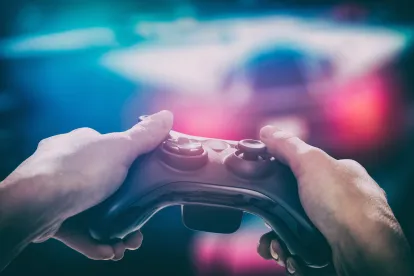For the most prestigious players, video games are more than just an entertaining pastime, but a source of livelihood. Competitive video games played at a professional level are known as esports; these consist of both single and multiplayer games, and come in a variety of formats, including card games, sports games, strategy games, and fighting games.[1] Many of the most popular esports are team-based games that are played in leagues or tournaments throughout the year.[2] While some may be hesitant to place video game players in the same category as their favorite basketball or football stars, in our increasingly digital world, there are many factors supporting such a classification. Esports athletes, just like their traditional counterparts, compete using a combination of finely tuned reflexes and rapid, strategic thinking. And just like other athletic activities, competition at a professional level often requires global travel. As video games become a professional endeavor, it creates new challenges for foreign gamers competing in the United States.
If international esports athletes enter the United States to compete on inappropriate visas, they expose themselves and their teams to potential liability, and may be subject to removal or denied entry into the United States. Professional athletes are permitted to enter the United States on B-1 business visitor visas, as long as they receive no salary or payment other than prize money.[3]However, the esports industry has grown in such a way that many competitors receive salaries or other types of U.S.-based remuneration. For example, in some leagues, players receive a guaranteed salary, with winning competitors earning even greater rewards.[4] As the industry has grown to parallel traditional sports, the P-1 athlete visa has become a viable option for esports athletes. U.S. Citizenship and Immigration Services (USCIS) approved a P-1 visa petition for an esports competitor for the first time in 2013,[5] expanding this visa category for non-traditional athletes. P-1 visas, which allow individual beneficiaries to enter the United States for up to five years with the possibility of a further five-year extension[6], are most appropriate for players of a professional caliber and have become increasingly popular for the esports participants who can obtain them.
P visa policy for athletes is somewhat fragmented and can be found in a number of sources including statutes[7], regulations[8], and the Foreign Affairs Manual[9]. Because neither the term “sport” nor “athlete” is clearly defined, USCIS has wide discretion to determine what types of activities and competitors fall within the boundaries of the P-1 visa criteria. And USCIS has demonstrated a willingness to expand the meaning of “athlete” beyond traditional sports, allowing individuals whose competitions involve mental dexterity (as opposed to physical) to be classified as athletes. The P-1A classification applies to individuals coming to the United States temporarily to perform as athletes at an internationally recognized level of performance, with provisions for both amateur and professional athletes.[10] Petitions for an internationally recognized athlete must include documentation of at least two evidentiary criteria,[11] and major esports athletes seem well-positioned to satisfy these criteria. Examples include evidence of having participated to a significant extent in international competition with a national team, or a written statement from a member of the sports media detailing how an applicant or team is internationally recognized.
The rapid growth of esports leagues, competitions, and press coverage further supports the eligibility of prestigious video game players under the P-1 criteria. The first competitive esports player to obtain a P-1 visa was Canadian Danny Shiptur, a well-known competitor of the game League of Legends, a multiplayer battle arena game.[12] He was followed by Korean Kim Dong-hwan, known for his skilled play of StarCraft II, a science fiction strategy game.[13] Both League of Legends and StarCraft II allow professional competitors to compete in highly publicized international tournaments, some of which award cash prizes in the millions of dollars. These tournaments are frequently held in traditional sports venues, and receive coverage from traditional sports television networks. For example, the League of Legends Championship has been held at Madison Square Garden and the Staples Center and has been broadcast by ESPN.[14] As professional esports franchises grow, the opportunity for players to qualify for visas based on their recruitment to professional athletic teams expands. For example, in 2018, American video game developer Blizzard Entertainment launched the first season of their Overwatch League, a professional league for the multiplayer video game Overwatch.[15] This league follows a traditional professional sports model, with permanent team franchises backed by an owner and tied to a major city.[16] Twenty teams will participate in the team’s 2019 season, with players receiving a minimum base salary of $50,000, healthcare and retirement savings plans, and housing provided during the season.[17] The Overwatch League has Official Rules and a detailed Code of Conduct, which all players, team managers, and owners are required to follow.[18] The League also employs a broadcast team and desk analysts who provide commentary for Overwatch League viewers.[19]Such infrastructure could increase access to P visas for esports players, coaches, and other support personnel as esports begin to model themselves after traditional sports leagues.
For some competitors, however, meeting P visa requirements remains a challenge. The P-1A visa criteria are highly specific, and each petition is considered on a case-by-case basis.[20] As a result the P-1 success rate in some games, such as League of Legends, has been quite high, while other esports athletes have faced denials, causing disruption when competitors fail to obtain visas needed to compete in events.[21] In October 2015, William Hjelte, a Swedish competitor in the game Super Smash Brothers Melee, reported that his P-1 visa application was denied on the basis that the game was not considered a legitimate sport by the U.S. government.[22] This came as a surprise to fans, as Super Smash Brothers Melee is a relatively high-profile game with tournament events offering considerable cash prizes.[23] Hjelte eventually received a P-1A visa in October 2016,[24] but his initial denial caused considerable outcry, with a petition urging the recognition of esports competitors as “athletes” gathering over 117,000 signatures.[25]
Both in the United States and abroad, the esports industry shows no sign of slowing down. In recent years, colleges have legitimized esports by offering athletic scholarships for competitive video game players, creating the possibility for athletes to meet P visa requirements with evidence of significant participation in U.S. college or university intercollegiate competition.[26] Even the International Olympic Committee has acknowledged the growing prestige of esports, speculating that competitive esports could one day be included in the Olympic Games.[27] The esports business has grown into a massive global industry, generating countless employment opportunities and massive revenue growth attributed to advertising, media rights, and big-name sponsorships. For example, Riot Games, the American video game development company behind League of Legends, has partnered with international sponsors such as Coca Cola.[28]Competitors, game developers, and sponsors all stand to benefit from esports athletes qualifying for P visas as the industry expands within the United States. USCIS has demonstrated a willingness to embrace these players as athletes and to give legitimacy to their leagues, tournaments, and awards. The P-1 visa has become a viable option for these international competitors, and the popularity of the visa among esports athletes stands to grow along with the popularity of professional esports themselves.
[1] Hannah Dawn, What are esports? A beginner’s guide, The Telegraph, October 18, 2017.
[2] Id.
[3] 9 FAM 402.2-5(c)(4)(a).
[4] Hannah Dawn, What are esports? A beginner’s guide, The Telegraph, October 18, 2017.
[5] Paresh Dave, nline Game League of Legends star gets U.S. visa as Opro athlete, L.A. Times, August 7, 2013.
[6] INA § 214(a)(2)(B).
[7] INA §101(a)(15)(P), 8 USC §1101(a)(15)(P); Creating Opportunities for Minor League Professionals, Entertainers, and Teams Through Legal Entry Act of 2006 (COMPETE Act of 2006) — PL 109-463, 120 Stat. 3477 (Dec. 22, 2006).
[8] 8 CFR §214.2(p); 22 CFR §41.56; 59 FR 41818–42 (Aug. 15, 1994); 72 FR 18856 (Apr. 16, 2007).
[9] 9 FAM 402.14.
[10] 214.2(p)(1)(ii)(A)(1); Memo, Aytes, Assoc. Dir. of Domestic Operations, USCIS, HQ 70/6.2.19 (Dec. 28, 2006).
[11] 8 CFR 214.2(p)(4)(ii)(B)(2).
[12] Paresh Dave, Online Game League of Legends star gets U.S. visa as pro athlete, L.A. Times, August 7, 2013.
[13] Alan Yu, U.S. Recognizes a South Korean StarCraft Player as an Athlete, NPR, December 15, 2013 .
[14] Jacob Wolfe, League of Legends to be broadcast on ESPN+, ESPN, May 25, 2018, ; Ben Gilbert,
Here’s what to expect from the sold-out video game tournament at Madison Square Garden this weekend, Business Insider, Aug. 21, 2015, .
[15] Blizzard Entertainment Establishes Professional Sports League for Overwatch.
[16] Id.
[17] here.
[18] here.
[19] here
[20] Paresh Dave, Online Game League of Legends star gets U.S. visa as pro athlete, L.A. Times, August 7, 2013, here.
[21] Bryce Blum, The esports lawyer breaks down the visa issue plaguing the LCS, ESPN, Feb 2, 2016, here.
[22] Ryan Burden, Super Smash Bros. Player Leffen Denied Visa, Comics Gaming Magazine, April 29, 2016, here.
[23] Id.
[24] Jacob Wolfe, Leffen receives athlete visa, approved to compete in the US, ESPN, Oct. 3, 2016, here.
[25] The USCIS Should Recognize All ESports As “Legitimate” Sports So International Players Can Come to the US on P1 Visas, here.
[26] 8 CFR 214.2(p)(4)(ii)(B)(2)(iii).
[27] Karolos Grohmann, E-Sports just got closer to being part of the Olympics, Business Insider, Oct. 28, 2017, here.
.here, Fortune, Aug 21, 2015, How Coke teamed up with the most popular eSports game in the world[28] John Gaudiosi,




 />i
/>i
